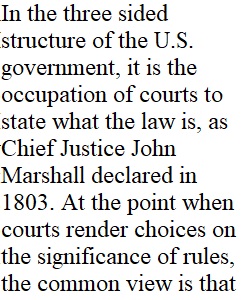


Q As you know from reading the material on administrative law, the primary value of administrative agencies is that they apply their expertise through regulations. Entities that are regulated by these agencies may sometimes object to that assertion of regulatory authority, or more commonly, may object to the scope and specifics of a regulation. In these cases the judicial branch can review agency action, but in general the courts grant deference to the agency's expertise. One frequent issue is where a statute is unclear or vague, and the regulated entity disagrees with that statute's proper interpretation with the regulating agency. Based on your reading of the material, how do courts typically handle such disagreements? What circumstances and/or evidence would be necessary for the regulated entity to win a court case challenging the regulating agency's interpretation of a statute?
View Related Questions